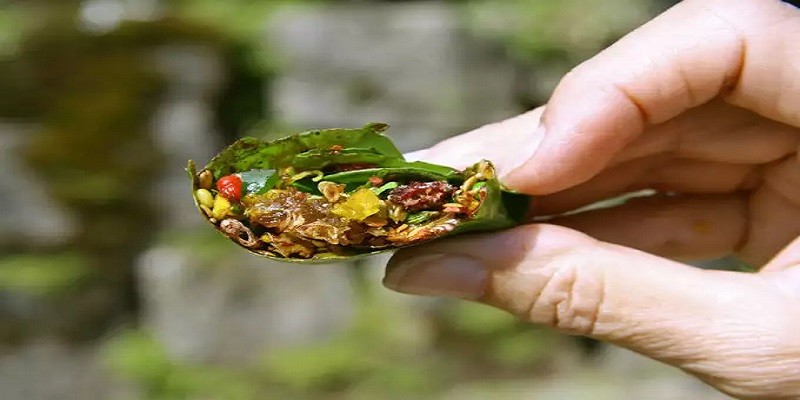Last Updated on July 25, 2024
It is generally not recommended to eat Meetha Paan during pregnancy due to potential risks associated with its ingredients. While occasional consumption of homemade, betel nut-free Meetha Paan may be safe, it’s best to avoid pre-packaged versions and limit intake overall. Consult your healthcare provider for personalized advice.
Pregnancy is a time when women need to be cautious about their dietary choices to ensure the health and safety of both mother and baby. Meetha Paan, a popular sweet treat in many South Asian cultures, often becomes a topic of concern for expectant mothers. This article explores the safety, risks, and alternatives to consuming Meetha Paan during pregnancy, providing evidence-based information to help pregnant women make informed decisions about their diet.
What is Meetha Paan?
Meetha Paan is a sweet version of the traditional betel leaf preparation popular in South Asian countries. It typically consists of a betel leaf filled with a mixture of ingredients such as areca nut (supari), slaked lime (chuna), sweeteners, coconut shavings, and various spices. Unlike its savory counterpart, Meetha Paan does not contain tobacco. However, the presence of betel nut and other ingredients raises concerns about its safety during pregnancy.
Nutritional Value of Meetha Paan
| Nutritional Value | Details |
|---|---|
| Calories | 5-160 per paan (varies by recipe) |
| Carbohydrates | 0.6-38g |
| Protein | 0-0.3g |
| Fat | 0-0.3g |
| Fiber | 0.1g |
| Vitamins | Small amounts of Vitamin A and Folic Acid |
| Minerals | Trace amounts of Calcium, Magnesium, Phosphorus, Potassium |
Risks of Eating Meetha Paan During Pregnancy
| Risks | Details |
|---|---|
| Cancer risk | Regular consumption may increase the risk of oral cancer |
| Mouth ulcers | Can cause mouth ulcers that may be slow to heal |
| Addiction | Potential for addiction due to stimulant effects |
| Cardiovascular issues | May affect heart rate and lead to palpitations |
| Hygiene concerns | Pre-packaged versions may not meet hygiene standards |
| Birth complications | Associated with higher rates of pregnancy complications and birth disorders |
Safe Ways to Eating Meetha Paan During Pregnancy
If you choose to consume Meetha Paan during pregnancy, it’s crucial to do so with caution. Opt for homemade versions where you can control the ingredients and hygiene standards. Avoid betel nut and tobacco entirely, and use fresh betel leaves. Limit consumption to occasional treats rather than regular intake. Always consult your healthcare provider before including Meetha Paan in your pregnancy diet. Remember that moderation is key, and it’s generally safer to choose alternative snacks that offer more nutritional benefits without the associated risks.
Alternatives to Meetha Paan During Pregnancy
| Alternatives | Precautions |
|---|---|
| Fresh fruits | Wash thoroughly before consumption |
| Yogurt with honey | Ensure yogurt is pasteurized |
| Dry fruits and nuts | Avoid excessive consumption due to high calorie content |
| Roasted chana | Choose unsalted versions |
| Fruit smoothies | Use pasteurized milk if including dairy |
Expert Tips
- “Pregnant women should avoid betel quid, including Meetha Paan, due to potential adverse effects on pregnancy outcomes.” (World Health Organization)
- “If craving something sweet, opt for fresh fruits or small portions of homemade desserts made with pregnancy-safe ingredients.”
- “Regular dental check-ups are important during pregnancy, especially if you’ve consumed betel products in the past.”
FAQs
Is it safe to eat Meetha Paan once in a while during pregnancy?
While occasional consumption of homemade, betel nut-free Meetha Paan might not pose significant risks, it’s generally safer to avoid it altogether during pregnancy. The potential risks, including hygiene concerns and the presence of harmful ingredients in some preparations, outweigh any potential benefits.
Can eating Meetha Paan during pregnancy harm my baby?
Yes, consuming Meetha Paan during pregnancy can potentially harm your baby. Studies have shown associations between betel quid use (including sweet versions) and increased risks of pregnancy complications, low birth weight, and birth defects. It’s best to err on the side of caution and avoid Meetha Paan during pregnancy.
Are there any benefits to eating Meetha Paan during pregnancy?
While some traditional beliefs suggest benefits like improved digestion or oral health, there’s no scientific evidence supporting these claims for pregnant women. The potential risks associated with Meetha Paan consumption during pregnancy far outweigh any perceived benefits. It’s safer to obtain nutrients from other, pregnancy-safe food sources.
What should I do if I’ve already eaten Meetha Paan during my pregnancy?
If you’ve consumed Meetha Paan during pregnancy, don’t panic. Inform your healthcare provider about your consumption, including frequency and ingredients. They can monitor your pregnancy more closely if needed. Moving forward, it’s best to avoid further consumption and focus on a balanced, pregnancy-safe diet.
Can I eat betel leaves without the other ingredients during pregnancy?
Plain betel leaves may be less risky than full Meetha Paan, but they can still contain compounds that might affect pregnancy. If you’re considering consuming betel leaves alone, consult your healthcare provider first. It’s generally safer to choose alternative leafy greens that offer similar nutritional benefits without potential risks.
Conclusion
While Meetha Paan is a beloved treat in many cultures, its consumption during pregnancy poses potential risks that outweigh any benefits. Pregnant women are advised to avoid Meetha Paan, especially pre-packaged versions, due to concerns about hygiene, harmful ingredients, and potential impacts on pregnancy outcomes. Instead, focus on a balanced diet rich in fruits, vegetables, and pregnancy-safe snacks. Always consult with your healthcare provider for personalized advice on diet during pregnancy. Prioritizing the health and safety of both mother and baby should guide all dietary decisions during this crucial time.

